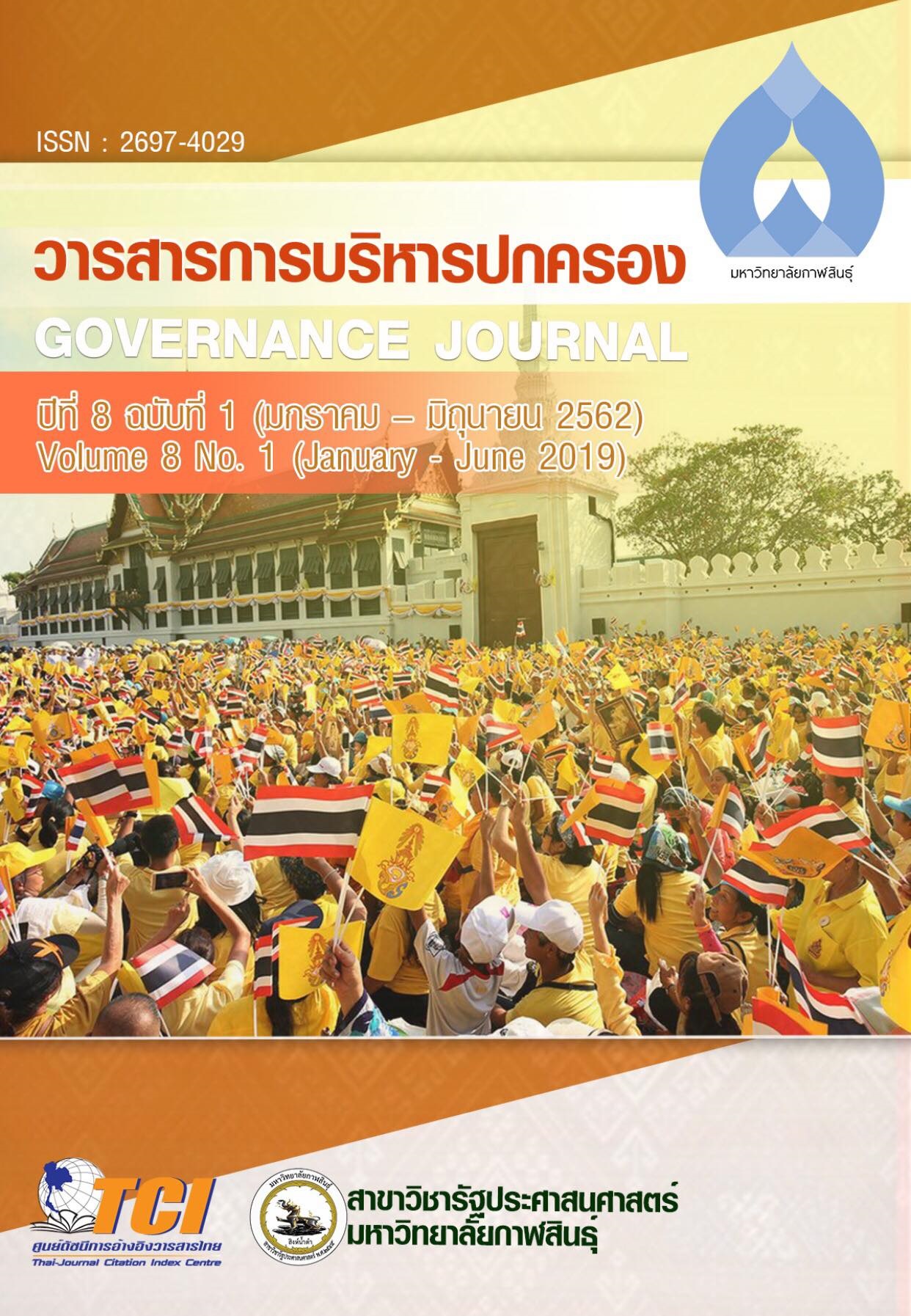การเมืองว่าด้วยการเคลื่อนไหวทางสังคมของภิกษุณี
DOI:
https://doi.org/10.14456/gjl.2019.8คำสำคัญ:
การเมือง, การเคลื่อนไหวทางสังคม, ภิกษุณีบทคัดย่อ
บทคัดย่อ
การวิจัยเรื่องนี้มีวัตถุประสงค์ดังนี้ เพื่อศึกษาการสร้างพื้นที่ทางสังคม ความสัมพันธ์เชิงอำนาจ และการเคลื่อนไหวทางสังคมของภิกษุณี โดยได้นำหลักของการวิจัยเชิงคุณภาพ (Qualitative Research) ในการเก็บรวบรวมข้อมูล ซึ่งมีกลุ่มเป้าหมายในการศึกษา ได้แก่ ผู้รู้ (Key Informants) ผู้ปฏิบัติ (Casual Informants) และบุคคลทั่วไป (General Informants) จำนวน 35 คน ปรากฏผลการวิจัย ดังนี้ 1. การสร้างพื้นที่ทางสังคมของภิกษุณีในประเทศไทยสามารถทำได้ในลักษณะของการเผยแผ่พระพุทธศาสนา การฝึกอบรมคุณธรรม จริยธรรม ศีลธรรมแก่พุทธศาสนิกชนและการเผยแผ่พระพุทธศาสนาในสื่อมวลชนทุกแขนงด้วยการยึดพระธรรมวินัยอย่างเคร่งครัด แต่ก็มีการให้พื้นที่ทางสังคมแก่ภิกษุณีในการดำเนินการดังกล่าวยังไม่มากเท่าที่ควรเหมือนกับพระสงฆ์ 2. ความสัมพันธ์เชิงอำนาจของภิกษุณีที่มีต่อศาสนาในวัฒนธรรมไทย เป็นการนำเสนอความแตกต่างระหว่างเพศหญิงและเพศชายทางสรีระได้นำไปสู่ความเชื่อที่ว่าผู้หญิงและผู้ชายมีความแตกต่างกันในทางอื่นๆ ด้วยไม่ว่าจะเป็นในเรื่องสติปัญญา ความสามารถ ความถนัด จิตใจ และอารมณ์ ไม่สามารถเปลี่ยนแปลงได้นำไปสู่สถานะของผู้หญิงที่ด้อยกว่าผู้ชาย 3. การเคลื่อนไหวทางสังคมของภิกษุณีภายใต้กฎหมายคณะสงฆ์ของไทยเป็นการเคลื่อนไหวของภิกษุณีเพื่อไม่ให้มองว่าผู้หญิงเป็นเพศที่นำมาซึ่งอันตรายต่างๆ การไม่ยอมรับวิธีการต่างๆ ที่จะช่วยให้ผู้หญิงสามารถบวชเป็นภิกษุณีได้จนส่งผลให้เสรีภาพในพระพุทธศาสนาที่ผู้หญิงพึงจะได้รับมีการดำเนินการไปอย่างไม่เสมอภาคเท่าเทียมกับผู้ชาย
Downloads
เอกสารอ้างอิง
ปิยะนาฏ จันทร์กระจ่าง. (2546). กระบวนการประทับตราบาปจากสังคม :
กรณีศึกษาเด็กและเยาวชนที่กระทำผิดซ้ำในความผิดเกี่ยวกับการเสพยาบ้าในจังหวัดเชียงราย. ศิลปศาสตรมหาบัณฑิต, มหาวิทยาลัยเชียงใหม่.
ปิยะนาถ อังควาณิชกุล. (2560). การศึกษาสถานภาพและวิถีชีวิตสตรีไทยภาคเหนือ
จากงานบันทึกผ่านจิตรกรรมล้านนา. วารสารสถาบันวัฒนธรรมและศิลปะ. 37(1): 83-91.
พรพรรณ จัยสิทธิ์.(2547). การเลือกปฏิบัติต่อสตรีไทยตามกฎหมายศึกษากรณีการ
บวชภิกษุณีตามหลักพุทธศาสนาในประเทศไทย, นิติศาสตรมหาบัณฑิต, มหาวิทยาลัยรามคำแหง.
พระวิชาญ จูมครอง (วุฑฒิโก) และประเทือง ม่วงอ่อน. (2561). การเมืองเรื่องการ
แต่งตั้งสมณศักดิ์พระครูสัญญาบัตรจังหวัดอุบลราชธานี. วารสารการบริหารปกครอง, 7 (1): 87 - 106
พลเผ่า เพ็งวิภาศ. (2561). การวิเคราะห์บทบาทของภิกษุณีในพระพุทธศาสนา.
ปริญญาพุทธศาสตรดุษฎีบัณฑิต, มหาวิทยาลัยมหาจุฬาลงกรณราชวิทยาลัย.
Kanai Lal Hazra.(2002). History of Theravada Buddhism in South-East
Asia. New Delhi : Munshiram Manoharlal Publishers.
Translated Thai References
Jaisit, P. (2547). Discrimination against Thai Women by Law: A Case
Study of Ordain to be Bhikkhuni on Buddhism Principle in Thailand. Master of Lows, Ramkhamhaeng University.
Joomkrong (Wuttigo), P. W., & Moungon, P. (2018). The Politics of
Appointing Honorific Ranks of Provost Dean in Ubon Ratchathani. Governance Journal, 7 (1), 87-106. Retrieved from https://www.tci-thaijo.org/index.php/gjournal-ksu/article/view/132104
Junkrachang, P. (2546).Social Stigmatization : A Case Study of Juvenile
Recidivism on Amphetamine Addiction in Chiang Rai Province. Master of Arts, Chiang Mai University.
Phengwiphat, P.(2561). An Analysis Of The Role Of Phikkhunis In
Buddhism. Doctor of Philosophy, Graduate School ,
Mahachulalongkornrajavidyalaya University.
Ungkawanichakul, P. (2560). A Study of Status And Way Of Life Of Northern
Thai Women From Documents And Mural Paintings In Lanna. Institute of Culture and Arts, Srinakharinwirot University. 37(1): 83-91.
ดาวน์โหลด
เผยแพร่แล้ว
รูปแบบการอ้างอิง
ฉบับ
ประเภทบทความ
สัญญาอนุญาต

อนุญาตภายใต้เงื่อนไข Creative Commons Attribution-NonCommercial-NoDerivatives 4.0 International License.








